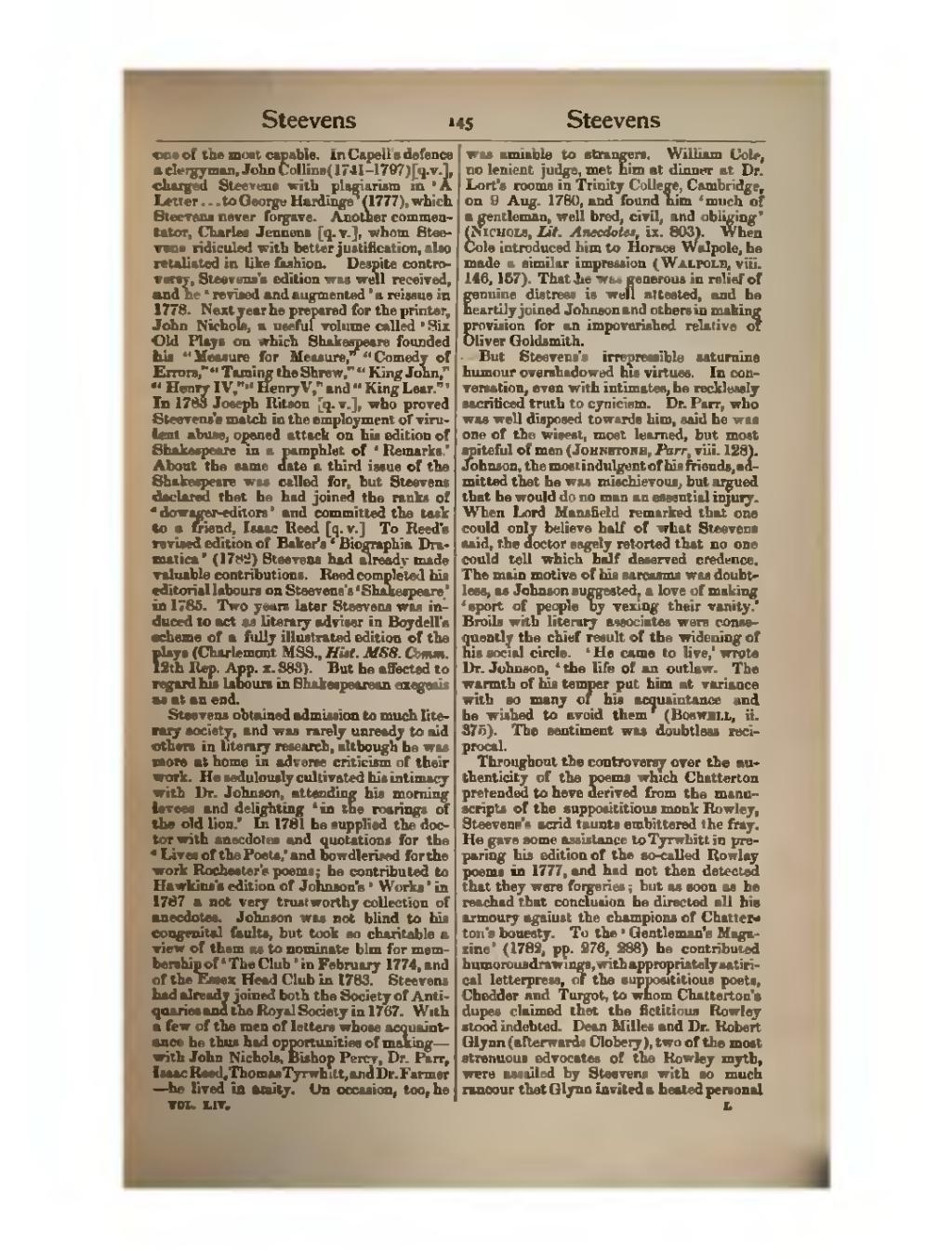one of the most capable. In Capell's defence a clergyman, John Collins (1741–1797) [q. v.], charged Steevens with plagiarism in ‘A Letter … to George Hardinge’ (1777), which Steevens never forgave. Another commentator, Charles Jennens [q. v.], whom Steevens ridiculed with better justification, also retaliated in like fashion. Despite controversy, Steevens's edition was well received, and he ‘revised and augmented’ a reissue in 1778. Next year he prepared for the printer, John Nichols, a useful volume called ‘Six Old Plays on which Shakespeare founded his “Measure for Measure,” “Comedy of Errors,” “Taming the Shrew,” “King John,” “Henry IV,” “Henry V,” and “King Lear.”’ In 1783 Joseph Ritson [q. v.], who proved Steevens's match in the employment of virulent abuse, opened attack on his edition of Shakespeare in a pamphlet of ‘Remarks.’ About the same date a third issue of the Shakespeare was called for, but Steevens declared that he had joined the ranks of ‘dowager-editors’ and committed the task to a friend, Isaac Reed [q. v.] To Reed's revised edition of Baker's ‘Biographia Dramatica’ (1782) Steevens had already made valuable contributions. Reed completed his editorial labours on Steevens's ‘Shakespeare’ in 1785. Two years later Steevens was induced to act as literary adviser in Boydell's scheme of a fully illustrated edition of the plays (Charlemont MSS., Hist. MSS. Comm. 12th Rep. App. x. 383). But he affected to regard his labours in Shakespearean exegesis as at an end.
Steevens obtained admission to much literary society, and was rarely unready to aid others in literary research, although he was more at home in adverse criticism of their work. He sedulously cultivated his intimacy with Dr. Johnson, attending his morning levees and delighting ‘in the roarings of the old lion.’ In 1781 he supplied the doctor with anecdotes and quotations for the ‘Lives of the Poets,’ and bowdlerised for the work Rochester's poems; he contributed to Hawkins's edition of Johnson's ‘Works’ in 1787 a not very trustworthy collection of anecdotes. Johnson was not blind to his congenital faults, but took so charitable a view of them as to nominate him for membership of ‘The Club’ in February 1774, and of the Essex Head Club in 1783. Steevens had already joined both the Society of Antiquaries and the Royal Society in 1767. With a few of the men of letters whose acquaintance he thus had opportunities of making—with John Nichols, Bishop Percy, Dr. Parr, Isaac Reed, Thomas Tyrwhitt, and Dr. Farmer—he lived in amity. On occasion, too, he was amiable to strangers. William Cole, no lenient judge, met him at dinner at Dr. Lort's rooms in Trinity College, Cambridge, on 9 Aug. 1780, and found him ‘much of a gentleman, well bred, civil, and obliging’ (Nichols, Lit. Anecdotes, ix. 803). When Cole introduced him to Horace Walpole, he made a similar impression (Walpole, viii. 146, 157). He was generous in relief of genuine distress, and joined Johnson and others in making provision for an impoverished relative of Oliver Goldsmith. Johnson left him his watch by will.
But Steevens's irrepressible saturnine humour overshadowed his virtues. In conversation, even with intimates, he recklessly sacrificed truth to cynicism. Dr. Parr, who was well disposed towards him, said he was one of the wisest, most learned, but most spiteful of men (Johnstone, Parr, viii. 128). Johnson, the most indulgent of his friends, admitted that he was mischievous, but argued that he would do no man an essential injury. When Lord Mansfield remarked that one could only believe half of what Steevens said, the doctor sagely retorted that no one could tell which half deserved credence. The main motive of his sarcasms was doubtless, as Johnson suggested, a love of making ‘sport of people by vexing their vanity.’ Broils with literary associates were consequently the chief result of the widening of his social circle. ‘He came to live,’ wrote Dr. Johnson, ‘the life of an outlaw. The warmth of his temper put him at variance with so many of his acquaintance and he wished to avoid them’ (Boswell, ii. 375). The sentiment was doubtless reciprocal.
Throughout the controversy over the authenticity of the poems which Chatterton pretended to have derived from the manuscripts of the supposititious monk Rowley, Steevens's acrid taunts embittered the fray. He gave some assistance to Tyrwhitt in preparing his edition of the so-called Rowley poems in 1777, and had not then detected that they were forgeries; but as soon as he reached that conclusion he directed all his armoury against the champions of Chatterton's honesty. To the ‘Gentleman's Magazine’ (1782, pp. 276, 288) he contributed humorous drawings, with appropriately satirical letterpress, of the supposititious poets, Chedder and Turgot, to whom Chatterton's dupes claimed that the fictitious Rowley stood indebted. Dean Milles and Dr. Robert Glynn (afterwards Clobery), two of the most strenuous advocates of the Rowley myth, were assailed by Steevens with so much rancour that Glynn invited a heated personal
